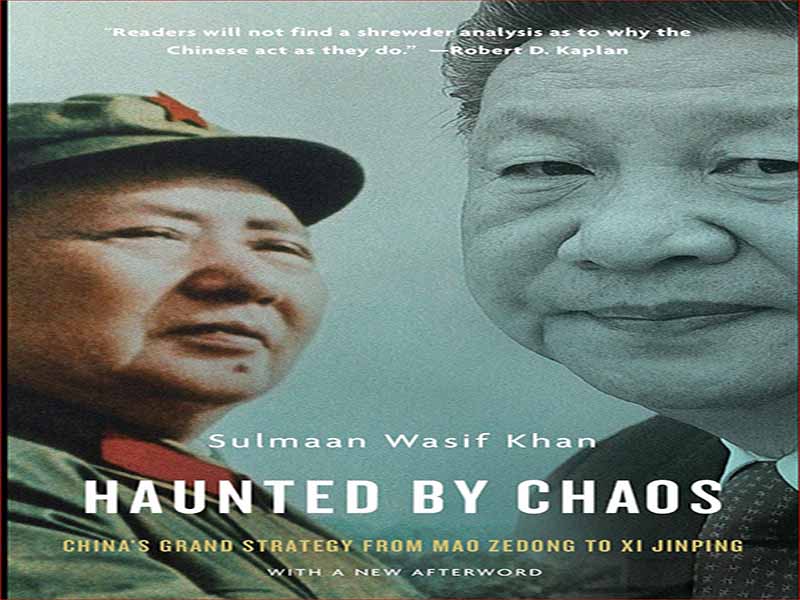- عنوان کتاب: HAUNTED BY CHAOS / China’s Grand Strategy from Mao Zedong to Xi Jinping
- نویسنده/انتشارات: Sulmaan-Wasif-Khan
- حوزه: چین
- سال انتشار: 2022
- تعداد صفحه: 337
- زبان اصلی: انگلیسی
- نوع فایل: pdf
- حجم فایل: 22.0 مگابایت
با وجود تمام علاقهای که چین در چند سال اخیر برانگیخته است، استراتژی بزرگ آن – روشی که از طریق آن اشکال مختلف قدرت را برای تعقیب اهداف ملی به کار میگیرد – هنوز به درستی مورد بررسی قرار نگرفته است. کسانی که این اصطلاح را به کار می برند اغلب ریشه ها و دامنه تاریخی آن را از دست می دهند. پس از آن نیز، کار آنها تمایل دارد تا تهدیدی را برای اهداف کشور قائل شود که خود استراتژیست های بزرگ چین را غافلگیر کند. مورخان کارهای بسیار خوبی در مورد سیاست خارجی چین انجام دادهاند، اما هنوز مطالعه تطبیقی درباره ایدههای اساسی امنیت ملی مبتنی بر رفتار جمهوری خلق چین (PRC) انجام ندادهاند. بدون توجه به بسیاری از کارهای مربوط به چین، از مائو تسه تونگ تا شی جین پینگ، تعریف ثابتی از اهداف ملی و استفاده از ابزارهای نظامی، دیپلماتیک، اقتصادی و سیاسی برای تعقیب آن اهداف وجود داشته است. تاریخ جذاب است – موضوع به دلیلی عملی نیاز به توجه دارد. در زمانی که امیدها و ترسها نسبت به چین به همان اندازه شعلهور و ناآگاه است، مهم است که محاسبات پشت تصمیمگیری چینی را بررسی کنیم تا جهان را آنگونه ببینیم که رهبران چین میبینند. درک به تنهایی نمی تواند سیاست درستی را ایجاد کند، اما اولین گام بسیار مهم است. این کتاب به دنبال چنین درک از طریق «مقایسه ساختاریافته و متمرکز» استراتژیهای بزرگی است که توسط رهبران اصلی جمهوری خلق چین: مائو زدونگ، دنگ شیائوپینگ، جیانگ زمین، هو جینتائو و شی جینپینگ دنبال میشوند. کدهای عملیاتی – مفروضات عمیق در مورد زندگی – که رفتار آنها را شکل داد چه بود؟ اهدافی که تعریف کردند و دنبال کردند چه بود؟ چگونه آنها دسته های مختلف قدرت را در تعقیب اهداف خود ترکیب کردند؟ و استراتژیهای بزرگ آنها چقدر در دنیای واقعی کار میکردند؟ البته محدودیتهایی برای چنین رویکردی برای مطالعه روابط خارجی و امنیت ملی چین وجود دارد. استراتژیست های بزرگ چین – مانند افراد در سایر اقشار زندگی – قادر به ناسازگاری بودند و گاهی اوقات خود را به اندازه مورخی که دنبالشان بود شگفت زده می کردند. علاوه بر این، چیزهای زیادی وجود دارد که حتی بهترین استراتژیست بزرگ نیز می تواند در مورد آنها توضیح دهد. بسیاری از چیزهایی که در زندگی چین مهم بوده است – بیکارانی که زندگی اراذل و اوباش اجیر شده را می گیرند، کادرهایی که در کره شمالی و ماکائو قمار می کنند، ناپدید شدن ماهی ماهی از دریاهای نزدیک – خارج از قلمرو استراتژی بزرگ اتفاق افتاده است و مشکلاتی را ایجاد می کند. پس از آن پکن باید برای پاسخ به آن تقلا کند. با این وجود، مردان مورد بحث، استراتژی بزرگی را تمرین کردند، که با وجود نادیده گرفتن آن، مقدار زیادی را نیز در بر می گرفت. نگاه دقیقتر به این که این استراتژیهای بزرگ شامل چه چیزهایی میشوند، بسیار ارزشمند است.
For all the interest China has excited in the last several years, its grand strategy—the way in which it marshals different forms of power to pursue national objectives—has yet to be explored properly. Those who invoke the term often miss its historical roots and scope; then too, their work tends to ascribe a menace to the country’s goals that would surprise Chinese grand strategists themselves. Historians have done excellent work on Chinese foreign policy, but have yet to produce a comparative study of the basic ideas of national security underpinning the conduct of the People’s Republic of China (PRC). Unremarked by much of the work on China, there has been, from Mao Zedong to Xi Jinping, a consistent definition of national goals and a harnessing of military, diplomatic, economic, and political means to pursue those goals.1 Historical interest aside—and the history is fascinating—the subject demands attention for a practical reason. At a time when hopes and fears of China are fervent and ill-informed in equal measure, it is important to explore the calculus behind Chinese decision-making, to attempt to see the world the way China’s leaders do. Understanding alone cannot make for sound policy, but it is a crucial first step. This book seeks such understanding through a “structured, focused comparison” of the grand strategies pursued by the PRC’s paramount leaders: Mao Zedong, Deng Xiaoping, Jiang Zemin, Hu Jintao, and Xi Jinping. What were the operational codes—the deep assumptions about life—that shaped their conduct?2 How did they perceive the world around them? What were the goals they defined and pursued? How did they meld different categories of power in pursuit of their objectives? And how well did their grand strategies work in the real world? There are, of course, limitations to such an approach to the study of China’s foreign relations and national security. China’s grand strategists—like people in other walks of life—were capable of inconsistency, sometimes surprising themselves as much as the historian on their trail. Besides, there are only so many things that even the best grand strategist can account for. Much that has been important in China’s life—the unemployed who take up the life of hired thugs, the cadres gambling in North Korea and Macau, the disappearance of mahi mahi from the near seas—has happened outside the realm of grand strategy, presenting problems that Beijing must then scramble to respond to. Nevertheless, the men in question did practice grand strategy, which, for all it left out, encompassed quite a bit too. A closer look at what those grand strategies involved is well worthwhile.
این کتاب را میتوانید از لینک زیر بصورت رایگان دانلود کنید:
Download: HAUNTED BY CHAOS / China’s Grand Strategy from Mao Zedong to Xi Jinping





































نظرات کاربران